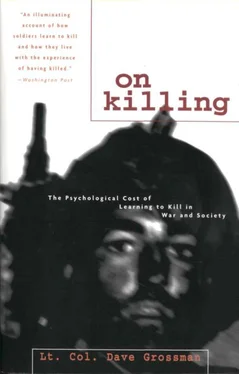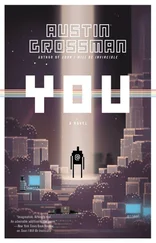There is not even a name for the specific study of killing. “Necrology” would be the study of the dead, and “homicidology” would have undesired connotations of murder. Perhaps we should consider coining the simple and precise term “killology” for this study, just as “suicidology” and “sexology” are terms that have been recently created for the legitimate study of these precise fields.
There has been considerable controversy concerning the quality of Marshall’s research in this area. Some modern writers (such as Harold Leinbaugh, author of The Men of Company K), are particularly vociferous in their belief that the firing rate in World War II was significantly higher than Marshall represented it to be. But we shall see that at every turn my research has uncovered information that would corroborate Marshall’s basic thesis, if not his exact percentages. Paddy Griffith’s studies of infantry regimental killing rates in Napoleonic and U.S. Civil War battles; Ardant du Picq’s surveys; the research of soldiers and scholars such as Colonel Dyer, Colonel (Dr.) Gabriel, Colonel (Dr.) Holmes, and General (Dr.) Kinnard; and the observations of World War I and World War II veterans like Colonel Mater and Lieutenant Roupell — all of these corroborate General Marshall’s findings.
Certainly this subject needs more research and study, but I cannot conceive of any motive for these researchers, writers, and veterans to misrepresent the truth. I can, however, understand and appreciate the very noble emotions that could cause men to be offended by anything that would seem to besmirch the honor of those infantrymen who have sacrificed so much in our nation’s (or any nation’s) past.
The latest volley in this ongoing battle was on the side of Marshall. His grandson, John Douglas Marshall, in his book Reconciliation Road put forth one of the most interesting and convincing rebuttals. John Marshall was a conscientious objector in the Vietnam War and was completely disowned by his grandfather. He had no cause to love his grandfather, but he concludes in his book that most of what S. L. A. Marshall wrote “still stands, while much of the way he lived deserves criticism.”
The universal distribution of automatic weapons is probably responsible for much of this large number of shots fired per kill. Much of this firing was also suppressive fire and reconnaissance by fire. And much of it was by crew-served weapons (e.g., squad machine guns, helicopter door gunners, and aircraft-mounted miniguns firing thousands of rounds per minute), which, as mentioned before, almost always fire. But even when these factors are taken into consideration, the fact that so much fire occurred and that so many individual soldiers were willing to fire indicate that something different and unusual was happening in Vietnam. This subject is addressed in detail later in this book, in the section entitled “Killing in Vietnam.”
This is an important concept. In both this section and in later sections we will observe the vital role of groups (including nonkillers) and leaders as we look at “An Anatomy of Killing.”
Marshall also observed that if a leader came close to an individual and ordered him to fire, then he would do so, but as soon as the obedience-demanding authority departed, the firing would stop. However, the focus in this section is upon the average soldier armed with a rifle or musket and his apparent unwillingness to kill in combat. The impact of obedience-demanding authority and the effect of group processes on crew-served weapons, i.e., machine guns, which almost always fire, and key weapons (i.e., flamethrowers and automatic rifles), which usually fire, are both addressed in “An Anatomy of Killing.”
I too have graduated from many a U.S. Army leadership school, including basic training, advanced individual training, the XVIII Airborne Corps NCO Academy, Officer Candidate School, the Infantry Officer Basic Course, Ranger school, the Infantry Officer Advanced Course, the Combined Arms and Services Staff School, and the Command and General Staff College at Fort Leavenworth. Not at any time in any of these schools do I remember this problem being mentioned.
The information in this section has been taken largely from Gabriel’s No More Heroes, which in turn was taken largely from the Diagnostic and Statistical Manual of the American Psychiatric Association and from Military Psychiatry: A Comparative Perspective, an anthology that he edited.
The cause of PTSD is associated primarily with the nature of the support structure the soldier receives upon returning to society from combat. This section is primarily concerned with the nature and etiology of psychiatric casualties occurring during combat. Post-traumatic stress disorder is a distinctly different type of psychiatric illness that will be addressed in detail in the section of this study entitled “Killing in Vietnam.”
It is important to note here that, although the lack of battlefield psychiatric casualties among medical personnel has held true in all wars about which I have data, Vietnam was very different in that the incidence of post-traumatic stress disorder appears to have been higher among medical personnel. I believe that this was due to the unique nature of what happened after the veteran returned from that war, and we will look at this in greater detail in the section “Killing in Vietnam.”
Frankl (1959), Bettelheim (1960), and Davidson (1967) are but a few of the many who have studied the psychological impact of this environment.
For example, Weinberg (1946), Weinstein (1947, 1973), and Spiegel (1973).
This is an excerpt from World War I veteran James H. Knight-Adkin’s “No Man’s Land,” a powerful poem that does a superb job of communicating some of the horror of the soldier’s dilemma:
No Man’s Land is an eerie sight
At early dawn in the pale gray light…
And never a living soul walks there
To taste the fresh of the morning air;
Only some lumps of rotting clay,
that were friends or foemen yesterday…
But No Man’s Land is a goblin sight
When patrols crawl over at dead o’ night;
Boche or British, Belgian or French,
You dice with death when you cross the trench.
When the “rapid,” like fireflies in the dark,
Flits down the parapet spark by spark,
And you drop for cover to keep your head
With your face on the breast of the four months’ dead.
The man who ranges in No Man’s Land
Is dogged by shadows on either hand
When the star-shell’s flare, as it bursts o’erhead,
Scares the gray rats that feed on the dead,
And the bunting bomb or the bayonet-snatch
May answer the click of your safety-catch,
For the lone patrol, with his life in his hand,
Is hunting for blood in No Man’s Land.
For an understanding of how it was possible for Nazis and Assyrians to kill at this “extreme” end of the spectrum, see Section V, “Killing and Atrocities.”
Quoted from an article by R. K. Brown. These are extracts from after-action reports describing the activities of Sergeant First Class (retired) Adelbert F. Waldron who, during his tour of duty as a sniper using a starlight scope and a noise suppressor (silencer) on his match- (competition-) grade M14 rifle, was credited with 113 confirmed kills and 10 blood trails in five months in Vietnam. Waldron’s fame spread, and he was given the nom de guerre Daniel Boone. Apparently, the VC were also impressed with his skill and put a fifty-thousand-dollar price on his head. Twelve hours after Army Intelligence discovered that Waldron had been identified and a bounty offered for his scalp, he was on a plane out of Vietnam.
Читать дальше







